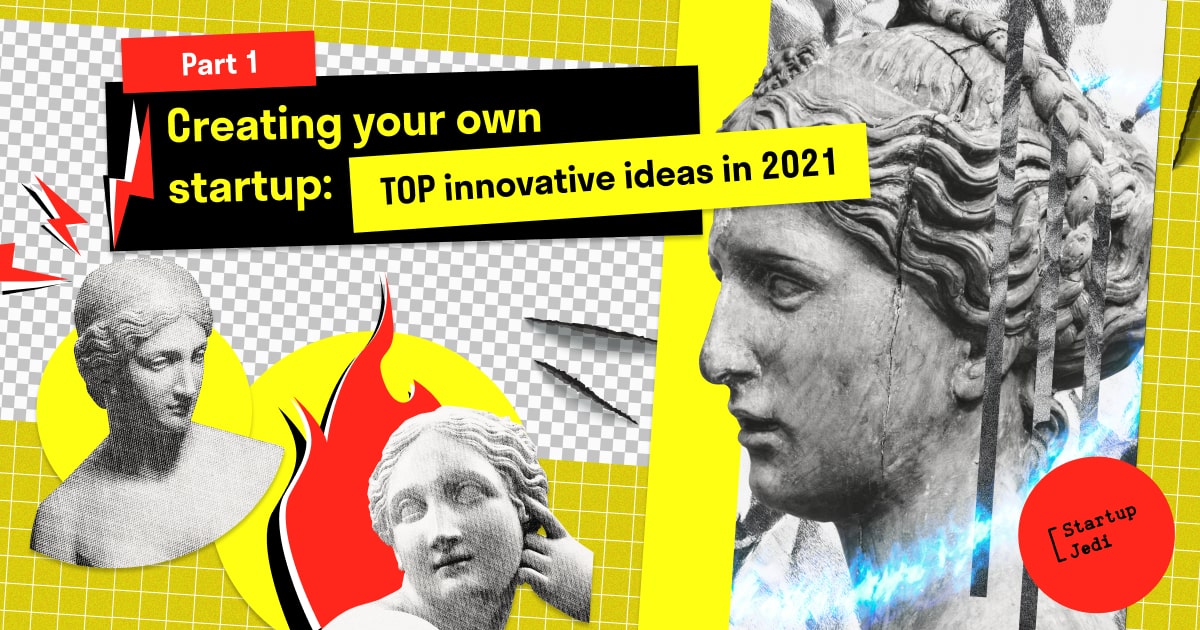
Startup Jedi
We talk to startups and investors, you get the value.
A work on a startup also has its own rules. Today we will talk about them in detail, and share the most promising and innovative startup niches with you.

Startup Jedi
We talk to startups and investors, you get the value.
Can you launch a startup without a genius product idea that is bound to become the new Facebook or Airbnb? You sure can. After all, it’s not the idea that leads to success, but competent and patient work with your target audience alongside a good team. There are many promising directions for startups available, just remember that working on a startup also has its own rules. Today we will talk about them in detail, and share the most promising and innovative startup niches with you.

It seems like everyone knows what a startup is in 2021. We read news about Tesla on Facebook, and order dinner at Yandex.Food. Yet, if you start asking, it turns out that opinions differ. Some consider any large company to be a startup, others only refer to companies in the IT industry, or a fast growing business. But there is actually still no single generally accepted definition of a "startup".
Here is the definition that Forbes voiced back in 1973, when the term "startup" just appeared: "A startup is an idea for a business based on the use of new technologies or the introduction of unique products."
Another popular definition belongs to Eric Rees, author of the book Lean Startup: "A startup is a new company that develops innovative products (or services) in an environment of complete uncertainty."
And here is the definition from Steve Blank, creator of eight successful startups and "godfather of Silicon Valley": "A startup is a temporary organization designed to search for a repeatable and scalable business model."
Perhaps all of them are correct and characterize one of the aspects of startups each. We can say that a startup is a business company that has all of the following characteristics:
short life span (up to 3-5 years);
use of new technology / creation of a unique product;
dealing with uncertainty (untested business model)
a scalable business model.
There is one more “informal” indication of a startup, namely startup culture. The very atmosphere of experimentation, search, creativity, lack of corporate codes and strict hierarchy.
Now everyone from online stores to barbershops calls themselves a startup, but many companies are not actually startups, since they do not have all that it takes to be one. Even if they have a creative spirit, their website is made according to all the principles of UX design, and all employees pray for a portrait of Steve Jobs before breakfast and Elon Musk before going to bed.
How to Tell Startups and Other Companies Apart?
Below is a table that helps you understand the differences:


There can be several classifications - for example, by scale:
local;
regional;
global.
Or by payback period:
instant: the startup pays off within a few months;
medium: a startup pays off within 2-3 years;
long-term: more than 5 years.
Sometimes, long-term payback is a deliberate strategy. For example, Facebook began to make money only 5 years after its launch. Until that time, the company spent all its investments on reaching new users. But it was this strategy that made Facebook a global, worldwide network.
By type of clients:
b2b (business to business) — the startup's product is designed for other companies;
b2c (business to customer) — the company's product is used directly by individuals;
b2g (business to government) — the product is designed for government organizations;
b2b2c is a mixed model where clients can be both business companies and individuals who are clients of these companies.

Many of the most famous and profitable startups in Russia are successful adaptations of Western products. For example:
Wildberries, analogue of Amazon.
These companies are no longer startups but rather large tech companies. Other well-known Russian startups include:
«Doktornarabote». A virtual community of doctors, 50% of whose members are certified doctors living and working in Russia;
StudyFree. A platform to help students study abroad, founded by 28-year-old Daria Kroshkina;
Miro. An internationally recognized online collaboration platform created by developers from Perm, Russia;
LinguaLeo. A service for teaching foreign languages, which is used by more than 14 million people around the world;
Playrix. An international video game company founded by the Bukhman brothers from Vologda.

There’s a bunch of companies worth mentioning here. We will not list the giants that everyone is well-aware of. Instead, here is a list of several young companies that are changing their industries right now.
TikTok is a social network with an audience of over 1.5 billion users;
Neuralink is a science startup that develops chips to enhance brain power;
Airbnb is a service for finding accommodation in other countries, which changed the travel industry;
Stripe is an online payment service with a valuation of $ 95 billion;
Instacart is an American grocery delivery service that has grown dramatically during the pandemic;
Rivian is a Tesla competitor that is set to launch electric pickups and trucks.
There are already more than 700 unicorns (companies with a capitalization of more than $1B) in the world. And it’s just the start!
In the second part, we will tell you about the stages of startups development, give step-by-step instructions “How to create your own startup”, and also dwell on the best ideas for creating a startup in 2021.
Facebook: facebook.com/StartupJedi/
Telegram: t.me/Startup_Jedi
Twitter: twitter.com/startup_jedi
Comments